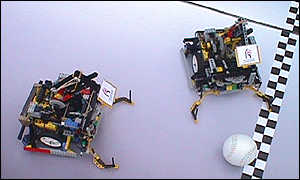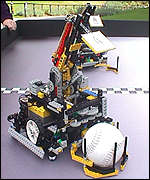| Robot Volleyball Competition |
|
||||||
|
Stiquito Kit BattleKits Robot Toys Solar Kits Robot Arms Robosapien Basic Stamp Kits Lego MindStorms
Hobby Robots Robot Sports Electronics Mechanics Robot Minds Books for Kids Robots at Work Microcontrollers Advanced Books Used Books
Robot Motors Remote Controls Robot Parts Robot Tools Magazines Robot Videos Robot News RoboLinks Contact
|
Courtesy BBC News Robot volleyball Five teams of two robots attempted to smack a softball from one side of the court to another at the British Association's Festival of Science in Sheffield, UK. Unlike the usual game, the ball rolls across the floor and if it is not returned within 60 seconds the point is lost. The teams are from the top robotics universities in the UK and Ireland. Kevin Warwick, leading the University of Reading's team said: "The robots are autonomous - a key aim in robotics. Once the game starts they are on their own." And they certainly were. Numerous technical time-outs were called and one robot limped off the field. The teams generally managed to serve without difficulty but returns were rarer than in a Pete Sampras serve game. A key challenge was to get the robots in each team to co-operate with one another. Trinity College, Dublin had one sweeper pushing the ball against the wall with the other robot picking it up and shooting. Foul ref Inadvertent dirty tricks handicapped the Irish team's first outing though, as their infrared detector was jammed by interference.
Trinity also had an excellent blocking manoeuvre to stop returns and this fooled Manchester's robots, despite their elegant pirouettes In the end, only the Cardiff's team speed came close to matching Trinity's but the latter emerged winners, pocketing a surprise £1,000 prize. Strategy in terms of placing the shots into tricky corners was the least of the competitors' worries. One of the University of Manchester team said the robots have 64k of computer chip memory but all but 3k of that is taken up controlling the sound, infrared and touch sensors. The robots are all built using Lego Mindstorm kits, but there a were no restrictions beyond that. The team from the Universities of Reading, which helped instigate the competition, came last. |
||||||
|
Advertise your product on RobotBooks.com Beginners Books |
Hobby Robots |
Robot Sports |
Electronics |
Mechanics |
Robot Minds |
Robot Fiction |
|||||||
